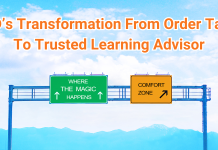
In recent years I have become a bit of a leadership junkie. As a media specialist working in education I am very aware that if you communicate you have influence, and if you have influence, you are by default, a leader.
So the question becomes, how do you want to lead?
One of the struggles of leadership is sometimes the terrain changes. This is ever more likely with technological and social advances. You may be a great manager in times of ease. Most people are. But what happens when things are not perfect?
This reminds me of the film The Godfather. When Michael was preparing to battle the other families, he replaced his step-brother as his trusted advisor:
“You’re not a wartime Consigliere, Tom. Things could get rough with the move we’re making.”
Good leaders make sure they have the right people in place, for the right job, at the right time.
Sadly too many peacetime “leaders” procrastinate, and fear making a decision that might be criticised when things get rough.
This week the UK was hit by a significant amount of snow, and we are not really used to it, or prepared. I live in Cumbria (Northern England) and for three days many schools, and some businesses, closed. The police said to only drive if absolutely necessary, because it was too dangerous.
So why would you then risk your life to drive to work or school?
The organisation you work for does not have a clear policy on staff absence.
This is particularly true for hourly paid staff. So if you cannot physically get in to work, and are advised by several authorities to not even chance it, will you get paid anyway? Many people are close to the poverty line, that one day's missed wages will cause massive disruption and stress.
My social media was lit up with people taking photos of the weather, and saying how worried they were about making the journey. But they were going anyway. Because they needed that money.
Communications were poor and you were not kept informed.
A good leader should either have a plan in place for the predicted storm and snow, or act fast when the situation deteriorates.
Cy Wakeman, of Reality Based Leadership, spoke of a lesson her boss taught her in the early days of her career.
And the weather brought an imperfect reality. I heard of examples of passive aggressive bullying by managers, to out-and-out threats. What they should have done is called all employees as early as possible, and told them to stay home and stay safe, and they would be paid anyway. The children are off school, elderly relatives need to be checked on, and they obviously have other priorities right now.
What would that have done for morale?
In Why Leaders Eat Last Simon Sinek states:
“Customers will never love a company until the employees love it first”
But instead I am hearing stories of how people hate their boss, and the company they work for. This is a bad return on investment. Especially if they leave and you need to advertise, recruit, and train someone new.
Educational institutions, on the whole, acted swiftly. But not all. This is even more scary.
As a school, college, or university, you should care about the students as a priority. The parents have taken something incredibly precious to them, and trusted you to educate them, but also to keep them safe from harm. Gary Vaynerchuk believes in this duty of care so much for his employees, he even created a post for Chief Heart Officer, the second most important role in his company:
“Caring about your employees doesn’t just mean providing them with health benefits or 401(k) plans. When I say “I care about my employees,” I really mean it. I’m passionate about knowing each and every one of them as individuals.”
Simon Sinek also writes of this in relation to Bob Chapman and Truly Human Leadership:
Every single employee is someone’s son or someone’s daughter. Like a parent, a leader of a company is responsible for their precious lives.
But sadly, the message that some places were closing took its time to get out there. Which is dangerous, and negligent for the following reasons:
In Cumbria students can travel long distances.
They might get a train at 7.20am. As a leader, you do not get to wait until you go in to work at 8am, to make a decision. This is wartime. You knew it was coming, you should be ready. A 16 year old heads off to college on the train, the parents head off to work thinking their child is safe, the teen gets off the train, walks to college, realises it has been closed, walks back to the train station, waits, maybe up to an hour for the next one, and heads home to an empty house. In terrible weather. What could go wrong?
Teenagers are inexperienced drivers.
This is a big one. Many that are in further education are driving to school or college, because they don't want to fall behind, they don't want to get in trouble, and they think the school/college is open.
These are new drivers! About to try and drive in hazardous conditions.
These are our children. And there is often no clear directive about whether they should try and get in to study. They are not listening to local radio, or necessarily following the Facebook page of their school or college.
Especially, or hopefully, not when they are driving.
Thankfully most educational institutions closed pretty fast. But one did not close until 10.20am. Which basically means they waited to see how many people would turn up. The decision was made for them.
Your teachers need all the help they can get.
This is something that is often overlooked. But most teachers care deeply for the students they educate, and over 50% now have mental health issues.
“Workload is jeopardising teachers’ mental health and the situation can’t go on”
The work is still there. A day off can be stressful. They have work to do. It's already too much to handle, they have to get in. So a lack of clarity as to if their work place is open, and if they will get paid, is unacceptable.
Who rose to the challenge?
But I heard amazing stories too. Owners of companies that had 4X4s sent them out to help the community, hotels offered a free extra night’s stay and food if their customers were stranded, NHS staff slept in hospitals overnight to make sure they were there for their patients in the morning.
Ordinary citizens worked together to clear roads to hospitals, collect prescriptions, and food supplies for those we could not venture out.
There were those that rose to the challenge.
We are all leaders, and need to be ready to step up and take responsibility when peace time is shattered, and we need to go to battle.
This could be family illness, debt, a power cut, tight deadlines, the list of struggles are endless.
And when times are tough, some leaders will lean in to the challenge and work for the good of their community, or tribe, others will hide and hope others fix the problem.
Which are you?





